Stories > Saving Young Lives
Saving Young Lives
Indian non-profit Cactus Foundation is dedicated to making the world a safer place for children.
BY SANDHYA MAHADE VAN
n 2020, the World Health Organization (WHO) estimated that up to 1 billion children between the ages of two and 17 have experienced physical, sexual or emotional abuse or neglect in the past year.
The Indian National Crime Records Bureau estimates that every 15 minutes, a child gets sexually abused in the country, more often than not by people known to him or her. Staggering as it sounds, the actual numbers could be much higher than reported, says Nusrat Khan Pahade, founder of India-based non-governmental organisation (NGO) Cactus Foundation, which has been fighting to create awareness and provide support to victims.
The reasons behind the lack of accurate reporting are deep-rooted cultural beliefs, self-blame, the taboo associated with topics that are sexual in nature in the country and, most of all, denial. These are the barriers that Nusrat, a clinical psychologist, and her team have been striving to break through.
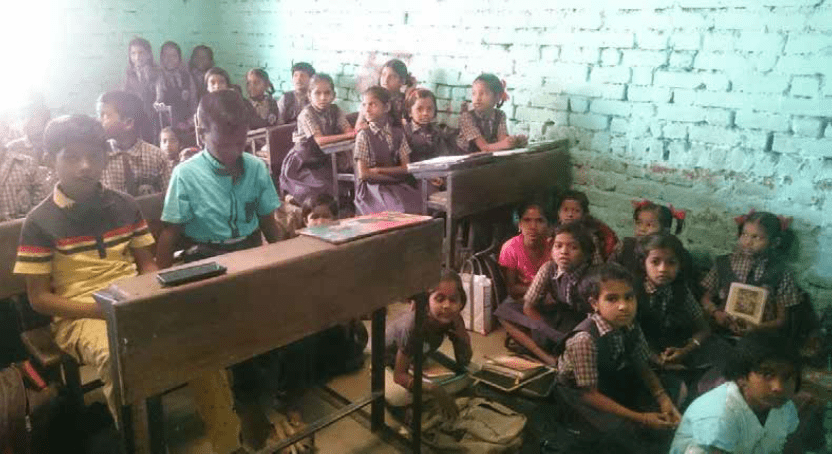
Nusrat and her team have visited more than 250 schools and colleges around the Indian towns of Pune, Solapur and Ahmednagar – all in Maharashtra – in the past three years, educating over 120,000 children.
BREAKING THE SILENCE
A victim of child sexual abuse herself, it was only at the age of 31 that Nusrat was able to come to terms with her own traumatic past, and at the encouragement of her husband, Rohit Pahade, formed Cactus Foundation in Pune, India.
“Child sexual abuse is a major cause of whatever problems we experience as adults, yet we tend to dismiss it from our conversations and reasoning,” she says. “Cactus Foundation was set up because it was apparent that child abuse was a universal problem. So many children have been through it or are going through it, and it can happen to anyone at any time.”
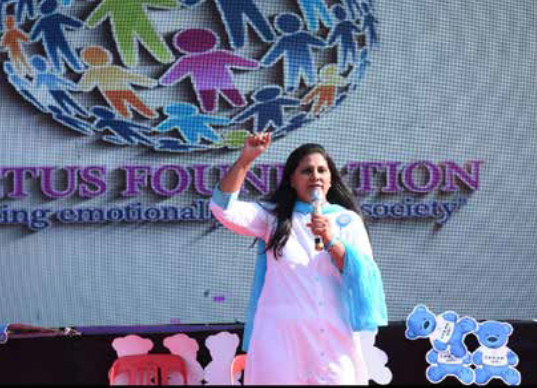
Cactus Foundation conducts roadshows for all the stakeholders, such as parents, schools and those who ply the children to and from schools, to create awareness about child sexual abuse and related topics that are usually considered taboo.
Indeed, as she dug deeper into the behavioural patterns of her adulthood and health issues, she was able to form connections with the ordeal of having been sexually abused as a child. She became more aware of its detrimental effect on physical, mental and emotional well-being.
“Cactus Foundation was set up because it was very apparent that child abuse was a universal problem. It is a silent pandemic that people need to start acknowledging.”
Nusrat Khan Pahade, founder, Cactus Foundation
Despite having open-minded parents, many children like her have kept their experience a secret from their families. “It is a silent pandemic that people need to start acknowledging,” she says.
SPREAD THE MESSAGE
Getting into the ring has meant speaking with the common man, rather than just educating children on the concepts of “safe and unsafe touch” and making it their responsibility to guard themselves.
Nusrat and her team have visited more than 250 schools as well as colleges around the Indian towns of Pune, Solapur and Ahmednagar – all in Maharashtra – in the past three years, educating over 120,000 children in the last decade. But the follow-up work they do is even more important.
“Our focus is on developing the emotional quotient of children,” she adds. In essence, Cactus Foundation offers a complete support system for children, making its model very different from other similar NGOs in the country. For instance, they speak with all the stakeholders in a child’s life – from parents and teachers to the drivers of school buses and rickshaws who take the children to and from school, and even the watchmen.
In Nusrat’s hometown of Solapur, Cactus Foundation is now connected with all the pillars of society that can create a safe environment, including the police and the legal system.
“The children no longer feel embarrassed to talk about such issues with their parents and express themselves,” says teacher Wahida Begum about the positive results of such conversations. With complete sensitisation being the goal, the team revisits the children every two years to remind them to keep up their vigil. The training content is also scaled according to age appropriateness. Having victims well into their adulthood come up to them, moved to tears, and relate their experiences have been small but consequential victories.
“There are times when we go into sessions and no one would admit to having been sexually abused. But our team is so well trained that we can see it in their eyes and their reactions to certain words,“ says Nusrat. They have even had perpetrators come up to them asking for help, to stop them from further committing such crimes.
SMALL TEAM, BIG IMPACT
Despite the high-impact work they do, Nusrat’s team is skeletal, comprising her mother, Nafisa Khan, and staff Rameshwar Irabatti. Her husband and her brother, Samir Khan, handle the back-end functions while juggling full-time jobs. The core team also comprises volunteers – mostly homemakers – including Sapna Rambia and Sandhya Taktode.
“Cactus Foundation made me aware of this important, basic right of every child to have a safe childhood. I am very happy to contribute towards creating a safe society for them,” reflects Taktode. Irabatti, who has been working with the NGO since its early years, was also motivated by its core principles. “For the past 15 years, I have watched Nusrat work tirelessly with no monetary benefits whatsoever. That dedication really inspired me,” he says.
“CACTUS FOUNDATION MADE ME AWARE OF THIS IMPORTANT, BASIC RIGHT OF EVERY CHILD TO HAVE A SAFE CHILDHOOD. I AM VERY HAPPY TO CONTRIBUTE TOWARDS CREATING A SAFE SOCIETY FOR THEM.”
MOVING BEYOND BORDERS
When the Covid-19 pandemic struck, Cactus Foundation’s work became more challenging than ever before. Due to lockdowns, cries of child sexual abuse became even more inaudible. Gradually, it became apparent through news reports that the situation had led to an increase in cases.
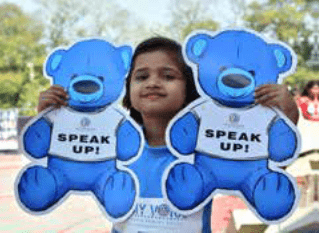
Through its awareness campaigns, Cactus Foundation teaches young children about unacceptable physical behaviour they might experience on a daily basis.
Unable to physically visit schools due to the lockdown, the NGO decided to take its call online. It organised a four-day intercontinental conference called “Beyond Borders” that garnered 1,600 registrations from 29 countries, with approximately 600 people signing in on Zoom every day. On the first three days, they had speakers from similarly purpose-driven organisations in the US, Australia and Nigeria. On the last day, they conducted a chat session that was open to survivors of child sexual abuse.
Feather Berkower, founder of Coloradobased non-profit Parenting Safe Children and one of the speakers at the conference, lauded Cactus Foundation on its tireless and now cross-border work towards ensuring a safer world for children. “People from around the globe were in attendance, including educators, parents, survivors and youth advocating the prevention of child sexual abuse worldwide,” she said.
Aside from the minimal expense of purchasing a subscription to the online meeting platform, the conference was made possible by the physical hours put in by the non-profit’s team, says Pahade. “To see people crying on a Zoom call, in front of 600 veritable strangers, was an emotional moment for all of us,” he says, adding that the people who had gathered did not want to leave the safe space – even if virtual – where their voices could be heard.
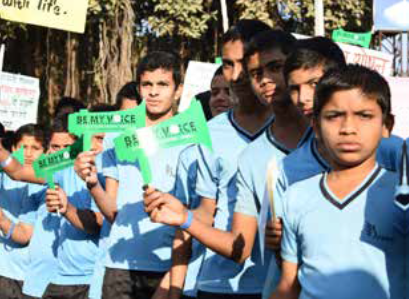
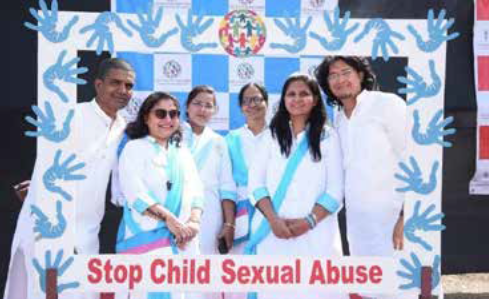
Due to the relentless efforts of Cactus Foundation, many young children, who have attended the nonprofit’s child sexual abuse awareness campaigns, feel empowered to share their experiences with family and teachers; Nusrat (second from right) and her team of volunteers.
In spite of everything, scaling remains a challenge for Cactus Foundation due to the lack of funding. Media exposure has helped to an extent. In 2018, a story and video on the non-profit published by Our Better World, Singapore International Foundation’s digital storytelling platform, garnered close to 1.8million views and encouraged over 1,000 volunteer sign-ups within a month. A follow-up story in January 2021 calling for donations had a similar response from volunteers.
The Zoom conference, too, has widened its global audience. Cactus Foundation has since entered into long-term collaborations with two NGOs in the Philippines and France, and with one of the panellists at the conference. The online event has also led to mutually beneficial partnerships with NGOs in the US, Australia, France, the Philippines and Nigeria – from knowledge exchange to creating awareness and enhancing visibility of each other’s initiatives among their respective communities.
“The 12 Action Point Agenda, which Cactus Foundation launched recently in partnership with NGOs in the Philippines and France, is a community project that is not just about sexual abuse but also to help create a world where toxic masculinity is challenged,” explains Nusrat.
TOWARDS THE FUTURE
Currently, Cactus Foundation has about 300 survivors undergoing counselling. Plans are also in the pipeline with the aim of creating a network of support and therapy for survivors, as well as primary caregivers. While expanding their reach to other states in India remains top of mind, Nusrat is also particular about quality over quantity. “Child sexual abuse is an issue that needs a lot of sensitive handling. That can create a huge impact on a child’s sexuality and how he or she will approach life as a tween and teenager,” she points out.
This approach is especially evident when it comes to training workers who are able to handle the topic with sensitivity. All counsellors at the non-profit have stayed and trained with it for at least one year. Cactus Foundation certification is also available for keen advocates of child rights. “Approaching the topic of sexual abuse with children, usage of words, and the manner in which they are used, are all critical components of the training,” she says.
“We do not believe in the tick-the-box culture. We are against doing things just for the purpose of visibility,” adds Pahade.
“The lack of funding does not, in any way, hinder our focus or the work we know we have to continue doing in order to create a world that is safe and healthy for young children to grow up in.”
PROTECTING THE YOUNG
These are some non-governmental organisations (NGOs) that advocate for children’s rights and create awareness of child sexual abuse around the world.
Thorn, co-founded by actors Ashton Kutcher and Demi Moore, is dedicated to preventing child sex trafficking – particularly the role played by technology. The California-based NGO launched an initiative, Spotlight, in 2016 as part of its tech-led innovations to end online child sexual abuse. The product has so far identified 14,874 victims at the rate of 10 per day – a 60 per cent reduction in critical search time for law enforcement.
ECPAT International coordinates research, advocacy and action to protect children from exploitation of all kinds and to empower victims. The Bangkok-based NGO has a global network of 110 civil society organisations across 100 countries, comprising researchers, campaigners, service providers and survivor-led organisations, who work on the mandate to end sexual exploitation of children because of prostitution, trafficking, online predators and the tourism sector.
HandsOff Initiative conducts regular outreach programmes to break the systemic cycle of rape, sexual abuse and assault of children in Nigerian society. Established in 2018, the NGO visits schools and communities to teach children, teenagers and young adults about consent.

Scan the QR code or visit
www.ourbetterworld.org/story/
breaking-silence-child-sexual-abuse to find out more.
